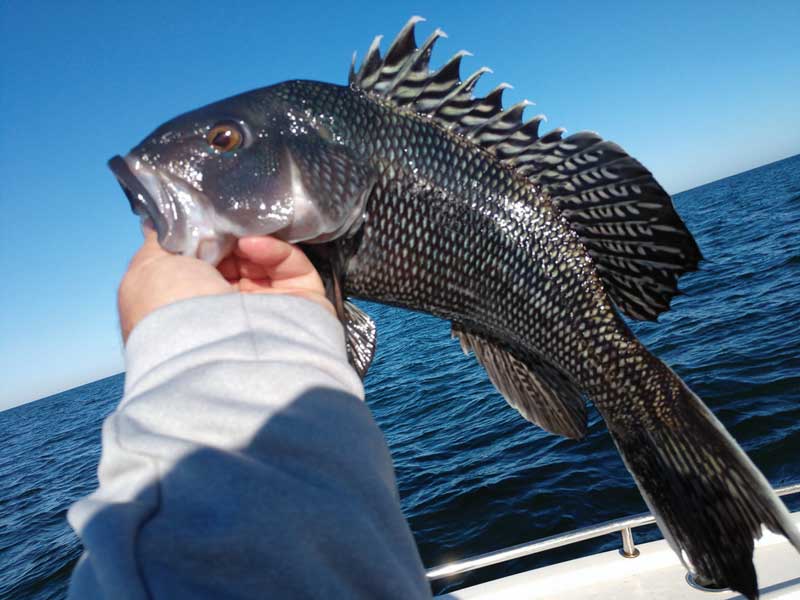Black sea bass have been a stable of ocean fishing for many years, and right now, they are in an upswing of their population cycle. This is great news for anglers who enjoy a good meal of fine tasting white-meat fish.

Like all fish, black sea bass travel to parts of their environment where food and water temperature are to their liking. They prefer cooler water and bottom structure that attracts and holds the food they like. This includes crabs, squids, small fish, shellfish, and just about anything else they can get into their mouth.
The efforts of Delaware and the Ocean City Reef Foundation have provided habitat for black sea bass where commercial clamming destroyed the natural bottom many years ago. These artificial reefs draw black sea bass and other species like tog and flounder to one area where recreational fishermen can find them with relative ease.
Black sea bass move inshore during the colder months and offshore in the summer. Most anglers target them when they are close to Lewes, Indian River, or Ocean City inlets. If you have a trailer boat that can handle the ocean, a two-day trip to either of these ports is well worthwhile. If not, then I suggest a charter or head boat.
Over the past few years, I have taken the head boat Angler out of Ocean City. I did have one bad day several years ago when, for whatever reason, the darn fish would not bite, but every other trip has resulted in a 15-fish limit catch. The captain works hard to keep you on the fish and the mates are very helpful. A fact that I have come to appreciate more the older I get.
No matter what you fish from, the tackle will be the same. I use two outfits. My bottom bait rod and reel are a Tsunami Hybrid 20 reel on a Tsunami Classic TSCC 761 H rod. My jigging outfit is a Tsunami Forged TSFOR8LD-SI reel on a Tsunami Trophy Series TSSPJ-701H rod. Rigs are nothing fancy, just top-bottom with circle hooks spaced about eight to 12 inches apart. I use slow jigs from Diawa, and on my last trip in May, they produced just as well as bait. The only problem was jigs only catch one fish at a time and my buddy was hauling in double headers on his top-bottom rig.
When fishing from a head or charter boat you must use the same weight sinker as everyone else. If you try to use a lighter weight, you will drift faster and catch all the other lines. This will make you a very unpopular person.
Most of the time you will be drifting over rough bottom. You must hold the rod and be prepared to raise the rig up as soon as you feel the bottom change. Even then, you will still lose a few rigs, so take plenty of spares.
Head and charter boats will supply the bait, which is usually squid or clam. I bring Gulp! and it will stay on the hook longer and seems to work at least as well as the real thing.
When the bite is hot and you don’t seem to be getting any hits, 10 to one you don’t have any bait on your hooks. Fishing on credit will not work, even on black sea bass.
You are going to catch a fair share of small fish. If you use circle hooks and a dehooking device, you can flip them off quickly. Set the device in the circle hook, pull the line tight, and flip the fish over the line and back in the ocean. The fish are quickly released, and you never have to touch them.
One advantage to fishing on some head boats, including the Angler, is that the mates will clean the fish on the way back to the dock. The cost is reasonable, and you leave the boat with bags of filets, not coolers full of fish that have yet to be cleaned.
When fishing from your own boat, you will need the location of the various reef sites and wrecks. Captain Segull’s charts have that information, or if you can find one, the Delaware Fish and Wildlife Department puts out a book with all the locations of their artificial reefs. The Ocean City Reef Foundation requires a membership to acquire a list of their reefs.
If, like me, you want to fill the freezer with some very fine fish to see you through the winter, I suggest you take a trip to the coast and drop some bait or a jig down to some hungry black sea bass.
By Eric Burnley